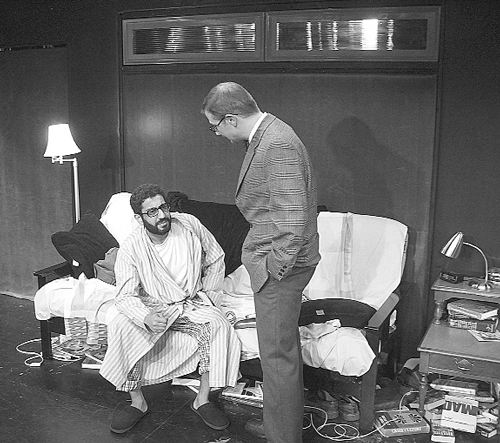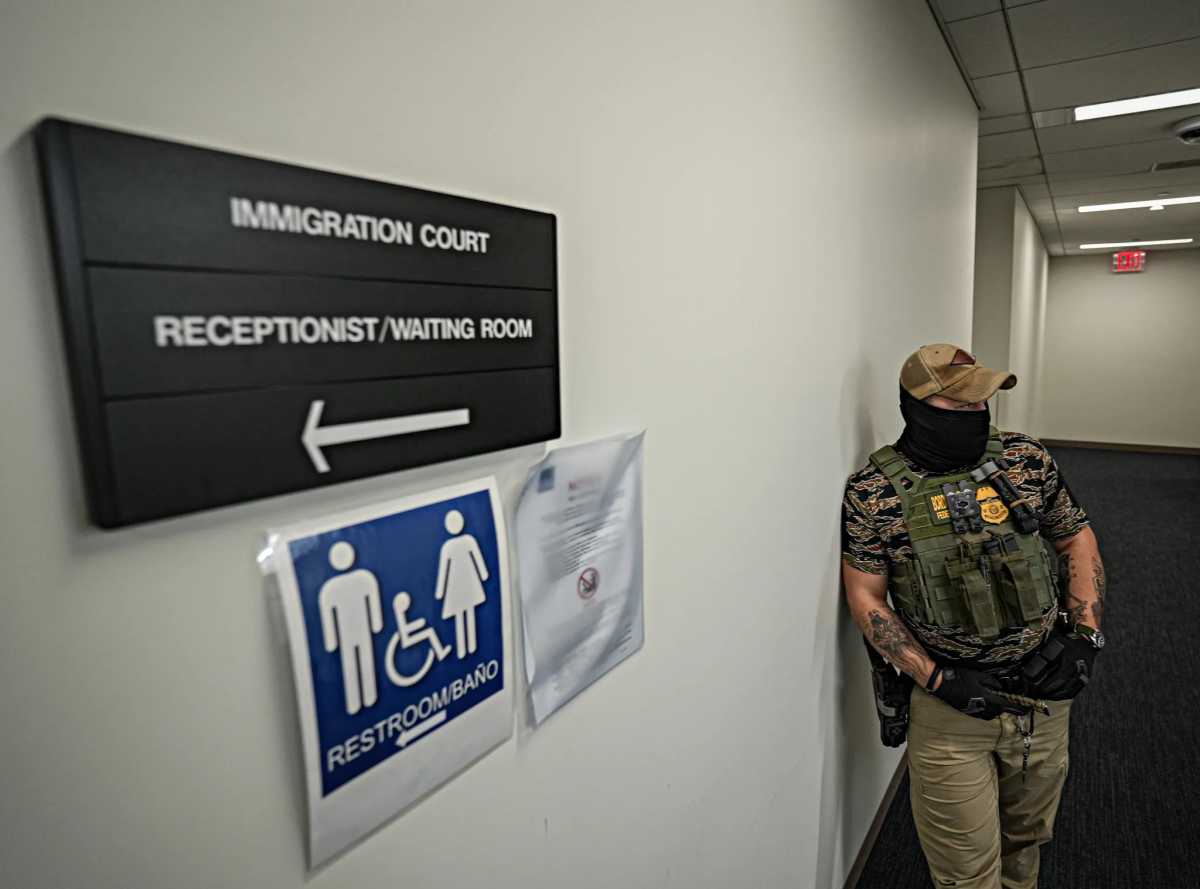By Steven Snyder
“Back of the Throat”
Written by Yussef El Guindi
Directed by Jim Simpson
Through July 1 at the Flea Theater
41 White Street
(212.226.2407, www.theflea.org)
Adeel Akhtar and Jason Guy in “Back of the Throat,” an unflinching look at racial profiling, post 9/11, now at the Flea Theater.
If anything’s been lost amidst the rhetoric of the “war on terror,” it’s the human dimension. We talk about the intangibles, things like “rights,” “evil” and “freedom,” but lose track of how things like Sept. 11, and the paranoia that followed, affect everyday people in everyday situations.
Enter Arab-American playwright Yussef El Guindi, whose “Back of the Throat” is an uncomfortable, up close confrontation with what it’s like to be on the other end of post-9/11 hysterics.
It starts in Khaled’s (Adeel Akhtar) apartment, a cramped New York City flat with an overflowing assortment of books and clothes. He has agreed to welcome in two police officers because, after all, what does he have to hide? But the further they dig around his home, and pointedly question his character, the more he regrets offering his cooperation.
Through these two, accusatory detectives, the various sides of reactionary, Sept. 12 America are crystallized. Bartlett (Jason Guy), a bow tie-wearing charmer, alternates between presenting a cheerful demeanor and systematically violating Khaled’s rights. He is a vulgar, detestable bigot whose hatred of immigrants contradicts his patriotic façade. Seemingly a psychopath, he is the more complicated — and most recognizable — aspect of the production. So many Americans say the same things Bartlett says, while also harboring the same hatred that has poisoned his soul.
Carl (Jamie Effros) is a far simpler character, representing that unseemly underside of the law most Americans accept, though rarely discuss. He’s the one rummaging around Khaled’s kitchen while Bartlett has a polite conversation with his suspect in the living room; the one who mercilessly beats Khaled after convincing Bartlett to go into the bathroom so that he will not be responsible for the atrocities to come.
It’s a simple formula spun in complicated directions. Bartlett and Carl think Khaled is a terrorist. Khaled considers himself an upstanding citizen and a writer — albeit a Muslim — who is trying to be tolerant of the intolerance that will go hand-in-hand with this new era of suspicion. But the more he tries to cooperate, informing these detectives that he was not at the strip club they think he frequented, nor an associate of a terrorist who just so happened to share the same library (the play’s most blatant Patriot Act reference), the more aggressive they become.
What’s missing from “Back of the Throat” — the title is a reference to Bartlett’s difficulty in pronouncing Khaled’s foreign name – are the subtleties of the argument. No doubt, as more news leaks out about our government spying on our phone calls and the extreme conditions now leading to suicides at Guantanamo, the extremes of this War on Terror are clear. The United States government firmly believes there is no limit to the powers it can assert under the auspices of national security, and a growing segment of the world’s population believes that America is going (or has already gone) too far.
But these headlines about wiretapping and abuse are only one side of the story, offset by the news of recently captured terrorists in Canada and the al-Qaeda plot to attack the New York City subways with cyanide. While some may think the government is now running wild, others see the real dangers targeting this country.
This is not a black and white subject, and while Guindi tries disastrously in later moments to add shades of gray, the play’s superficial two-note structure of corrupt cops and innocent victims weighs it down. Introducing a back story about Khaled’s ill-fated relationship with a woman (Erin Roth, playing multiple roles) who rats him out with the same anger and fear reminiscent of a witch hunt, and developing scenes around Khaled’s supposed trip to a strip club and his first encounters with the terrorist at the center of Bartlett’s questions, Guindi no doubt thinks he is calling Khaled’s purity into question.
But this belated, law-and-order setup doesn’t quite work. It feels like an awkward afterthought, interrupting the flow of the methodical, and far more effective, drama playing out in Khaled’s studio.
In “Back of the Throat’s” best moments, director Jim Simpson — working with an extremely intimate space – places us behind Khaled, and positions the detectives so that they are grilling, and attacking us. We are put in Khaled’s shoes and forced to identify with what it’s like to be arbitrarily persecuted and despised, mocked and beaten. But what would have made this a complete work, rather than a compelling one-act idea stretched out to fill a two-act space, is a bit more of Bartlett and Carl. If 9/11 changed Khaled’s place in our society, so too did it forever change what it meant to be a detective in a paranoid nation. And that is the one dimension of this story that feels dismissed and undeveloped.
The message of the play seems to be that Khaled should be seen for more than just his religion, name and skin color. I’d claim that his attackers should be seen for more than just their job title.
WWW Downtown Express



























